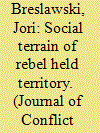| Srl | Item |
| 1 |
ID:
177026


|
|
|
|
|
| Summary/Abstract |
The extent of local order varies widely in rebel held areas, from total chaos to well-run governing institutions. When these institutions exist, why do some include civilian input in local affairs, while others exclude civilians from governance? I argue that rebels choose different governing strategies that maximize their utility of territorial control, based on certain characteristics of civilian inhabitants populating the territory. Rebels’ constituency determines whether rebels seek to govern civilians or control them solely with coercive violence, and community cohesion (or lack thereof) then determines the type of institutions that rebels develop. I focus on three different outcomes for communities under rebel control—no institutions, exclusive institutions, and inclusive institutions. I test my argument using historical, statistical, and case evidence, leveraging original cross-national data on local order in rebel held territory as well as interviews with village heads, ex-combatants, and community members in Aceh, Indonesia.
|
|
|
|
|
|
|
|
|
|
|
|
|
|
|
|
| 2 |
ID:
113725


|
|
|
|
|
| Publication |
2012.
|
| Summary/Abstract |
The security of civilians in contemporary conflicts continues to tragically elude humanitarians. Scholars attribute this crisis in protection to macro-structural deficiencies, such as the failure of states to comply with international conventions and norms and the inability of international institutions to successfully reduce violence by warring parties. While offering important insights into humanitarianism and its limits, this scholarship overlooks the potential of endogenous sources of protection - the agency of civilians. On the basis of a case study of northern Uganda, we identify and discuss several civilian self-protection strategies, including (a) attempts to appear neutral, (b) avoidance and (c) accommodation of armed actors, and argue that each of these is shaped by access to local knowledge and networks. We illustrate how forced displacement of civilians to 'protected villages' limited access to local knowledge and, in turn, the options available to civilians in terms of self-protection. Analyses of the intersections of aid and civilian agency in conflict zones would afford scholars of humanitarianism greater explanatory insight into questions of civilian protection. The findings from our case study also suggest ways in which aid agencies could adopt protection strategies that empower - or at least do not obstruct - the often-successful protection strategies adopted by civilians.
|
|
|
|
|
|
|
|
|
|
|
|
|
|
|
|